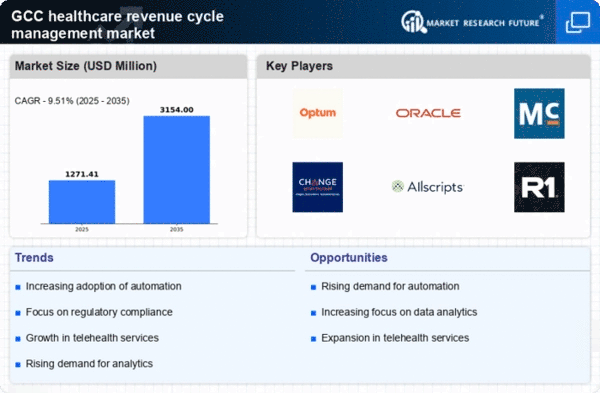The GCC Healthcare Revenue Cycle Management Market is witnessing significant transformations driven by advancements in healthcare technology and the ongoing shift towards value-based care. The competitive landscape of this market is characterized by a mix of established players and new entrants striving to enhance operational efficiencies and improve patient engagement. With a growing emphasis on transparency and accountability in healthcare expenditures, organizations are increasingly seeking comprehensive solutions that can streamline billing processes, reduce claim denials, and optimize revenue generation. As healthcare providers focus on delivering high-quality services while managing costs, the need for effective revenue cycle management has become paramount.
This evolving environment creates opportunities for companies to capitalize on innovative technologies, enhancing their market position and securing strategic partnerships that can facilitate growth and expansion across the GCC region.Conifer Health Solutions has established a notable presence in the GCC Healthcare Revenue Cycle Management Market by leveraging its extensive expertise in improving financial performance for healthcare providers. The company is recognized for its ability to integrate technology with clinical and financial processes, ensuring seamless operations that enhance revenue capture and mitigate risks associated with billing and collections.
Conifer Health Solutions stands out due to its strong emphasis on analytics-driven decision-making, allowing healthcare organizations to access key performance indicators and insights that inform strategic planning.
The company's focus on delivering customized solutions tailored to the unique needs of the GCC healthcare landscape further solidifies its status as a reliable partner for hospitals and clinics looking to optimize their revenue cycle management.McKesson plays a vital role in the GCC Healthcare Revenue Cycle Management Market, offering a comprehensive suite of products and services designed to enhance the efficiency of healthcare operations. The company provides solutions that encompass everything from coding and billing to patient financial services, enabling healthcare providers to streamline processes and improve cash flow.
McKesson's robust market presence is underpinned by its commitment to innovation, which is reflected in its investments in technology and analytics capabilities. The company's strengths lie in its ability to deliver integrated solutions that foster collaboration among stakeholders, ultimately promoting better patient outcomes and financial performance. Recent mergers and acquisitions have further strengthened McKesson's position within the GCC market, as these strategic moves allow the company to expand its service offerings and enhance its capabilities in line with the evolving needs of healthcare providers in the region.























Leave a Comment